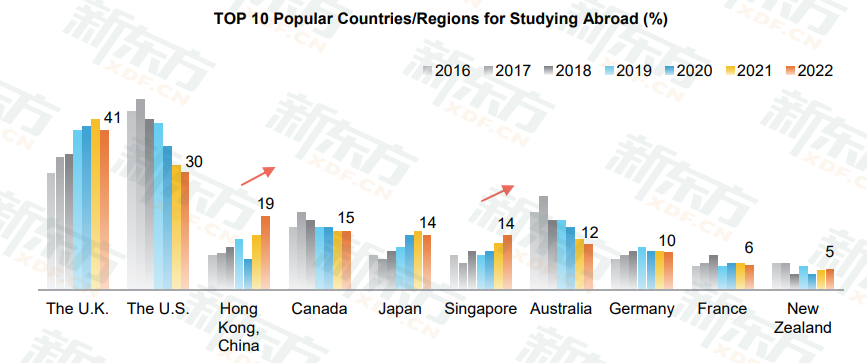Travel to China Just Became Much Easier (and Other Essential China Updates)
In recent weeks, China has relaxed quarantine and visa restrictions, paving the way for international admissions officers to enter China for recruitment travel and conferences and enabling Chinese students to return home for the summer holidays. Meanwhile, new survey data has been released that suggests that students view the US as a more attractive study destination than in previous years.
A Simplification of the Visa Application Process (For Some)
On July 1st, the Chinese Embassy announced several policy steps that will make it easier for international university representatives to obtain a visa to enter China. Previously, visa applications for short-term business trips, non-commercial exchanges, and full-time work (M, F, and Z class visas, respectively) required a “PU letter,” a government-issued letter of support for the application that most have found extremely difficult to acquire. Under the new rules, PU letters are not required for applicants in the UK, Singapore, France, and Italy. The Chinese embassy in the US now states that PU letters may not be required in some cases as well. Sunrise called the Chinese embassy’s visa office on July 1, and the officer confirmed that the presumption moving forward is that a PU letter will not be required for most applicants, though the officer reviewing the application will reserve the right to request one if the validity of the business trip appears questionable.
This follows a similar announcement from June 14th that US-based applicants will not need a PU letter to apply for a Z visa (for long-term, full-time work in China) and S visas (for family members of those entering on a work visa). However, visas for foreign students attending Chinese universities (X visas) are still not being issued as of the date of publication.
While these changes will not affect every individual anticipating a trip to China, the rules now allow for most international admissions and recruitment travel to return to China. After more than 2 years of prohibitive policy, this comes as welcome news for university representatives wishing to attend recruitment tours, international education conferences, admitted student receptions, and meetings with interuniversity partners. Moreover, they may make it marginally easier to recruit foreign teachers; as we noted in a previous article, novel regulatory legislation and the persistence of strict COVID-related travel measures have severely impacted the number of foreign instructors at international schools in China.
With these new policies in place, recruitment and work travel to China is once again possible! Currently, flight costs remain high, but we expect that these policies will increase demand for flights and encourage airlines to restore flights to China, bringing down fares in the coming weeks and months.
A Welcome Relaxation of Quarantine Requirements
On June 28th, China also announced that it would be relaxing their quarantine policies for international travelers; while their previous regulations required 21 days of quarantine (two weeks of quarantine in a hotel followed by an additional week of home quarantine), new guidelines stipulate just one week of hotel quarantine and three days of quarantine at home.
The implications for higher education are significant. While flight costs remain high and travel itineraries still need to build in time and budget for quarantine, recruitment trips are now more doable as participants will be out of commission for a shorter period of time. A 1-2 month business visit to China is no longer out of the question.
Arguably more impactful, though, is the effect this change will have on prospective students. Previously, owing to the length of China’s quarantine requirement, the process of heading home for summer break was daunting for Chinese students studying overseas; leaving China to pursue an education abroad likely meant leaving your family for two or three years - a challenging prospect, particularly for younger boarding school or undergraduate students. The softening of these requirements may be a reason for optimism among prospective students who want to be able to both study abroad and return home on a more regular basis.
Also, now that return travel to China will be a bit simpler, Chinese undergraduate students at foreign institutions will be more able to pursue internship opportunities within China during the summer. That this component of the undergraduate experience will once again be available may encourage prospective Chinese students to follow through on their interest in international education opportunities.
Overseas Education: US is Resilient as a Preferred Study Destination
Interest in the UK has declined, while the US continues to eclipse other common destinations in popularity
Regarding prospective Chinese students’ preferred overseas study destinations, a recent survey from New Oriental indicated that interest in the UK - which increased throughout the pandemic - has dropped to its lowest level since 2019, while interest in the US declined only slightly from 2021-22. It is therefore possible that the UK’s lead over the US as a preferred study destination has begun to narrow, and that the US may be improving in comparative attractiveness, representing a sort of rebound from its 2021 low when news stories about viral outbreaks, racism, and gun violence in the US were more prominent in China. Comparisons to the UK notwithstanding, the US remains one of the top preferred countries, Anglophone or otherwise; in fact, the US edged out Canada, Singapore, Germany, France, Australia, and New Zealand by substantial margins. Due to the slow relaxation of both travel and visa restrictions, along with the sustained interest in overseas study and the US’ resilience as an overseas study destination, we therefore recommend maintaining some level of investment in or engagement with the Chinese market throughout the 2022-23 academic year.

